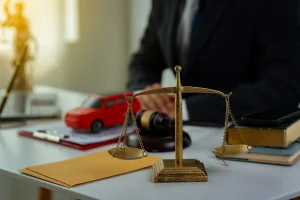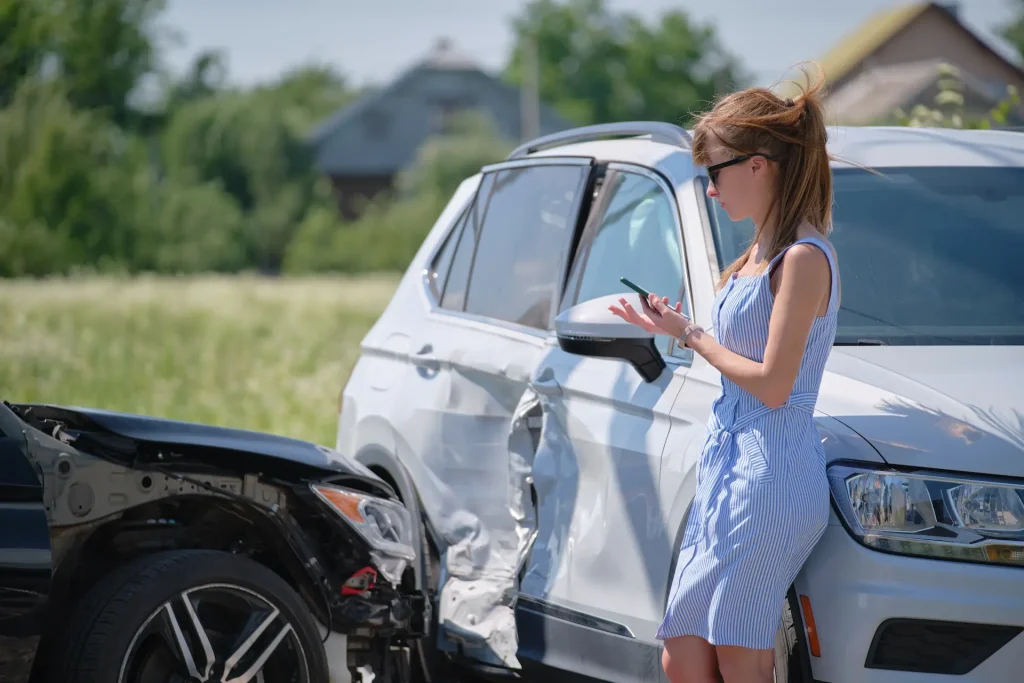What Insurance Information to Give in an Accident

After a car accident, obtaining accurate insurance information is crucial for making a claim, avoiding legal complications, and protecting your rights. Whether it’s a minor fender-bender or a more serious collision, sharing the right details is key in ensuring both parties are covered and legal requirements are met.
However, a common question we receive at The Callahan Law Firm is, “What details do I give in an accident?”
Being thorough during this exchange is essential – incorrect or incomplete information can cause misunderstandings, delay claims, or create legal obstacles. While it’s important to know what insurance details to give in an accident, it’s just as vital to protect your privacy by handling the process carefully.
Accidents are inherently stressful, but balancing transparency and caution will help you remain calm and guide you toward the best possible resolution. We’ll provide a clear, concise guide in this article to ensure you know what you can share and what to avoid at an accident scene.
What Insurance Information Do I Give in An Accident?
The information you exchange after an accident can impact how insurance claims unfold. Once you’ve ensured everyone involved is safe, the following is information that you and the other driver should exchange:
Contact Details
Make sure to obtain the other driver’s contact information and they will likely request yours. Such information includes the following:
- Full name
- Phone number
- Address
Insurance Details
Taking a picture of each other’s driver’s license and insurance card is a convenient way of gathering necessary information quickly, so don’t be alarmed if the other driver suggests it, but keep in mind that neither party is required to let the other take photos of their insurance card or any other personal documents.
Regardless of whether you exchange photos or take notes of each other’s information, these are the insurance details you need to be able to process your claims:
- Insurance company name
- Policy number
- Insurance company’s contact information
Driver’s License Information
Identity fraud is a genuine concern in the digital age, and it’s better to provide your details to the other driver in written format to reduce this risk. The information you should take down from each other’s driver’s licenses are:
- Driver’s license number
- Issuing state
Vehicle Information
Photos are useful for recording information about the vehicles involved and the accident scene. When possible consider taking photographs of the following:
- Vehicles involved
- License plate numbers
Effective Communication Practices
When exchanging information with the other driver, be clear and concise and keep calm. It’s important to avoid heated or emotional exchanges as these can complicate proceedings. Avoid accusations and it is likely best not to admit fault at the scene as you may not know all the facts as to the cause(s) of the collision.
Communication Dos and Don’ts
Do
- Remain polite and calm
- Avoid escalating tensions
- Stay calm
- Focus on facts and essential information
Don’t
- Apologize or admit fault
- Blame or accuse the other driver
- Speculate about either party’s injuries
- Offer opinions on the accident’s cause or severity

Legal Implications of Insurance Information Sharing
Knowing what insurance details to exchange in an accident can affect your claims process. Each driver involved in the collision should share their insurance information with each other. Unfortunately, not everyone is willing to do this. Which is one of the reasons it is important to call the police to the crash scene. During the course of their crash investigation, the police officer will require each driver involved in the crash to provide the office with the name and policy number of applicable insurance. This information will then be listed in the police officer’s crash report.
Additional Steps After Sharing Insurance Information
Once everyone is safe and the drivers have exchanged details, there are some more steps you need to take before you can file an insurance claim. Whether or not your insurance company requires it, it’s always best to make a record of the accident details and report it to the police as soon as possible.
Recording Accident Details
Document the accident scene and circumstances as clearly as possible, including photos:
- Take down the location and time of the accident
- Take photos of the vehicles involved, property damage, license plates, and accident scene
- Collect contact details from any witnesses
Police Involvement
It is best to call the police after a car accident, even if, at the time, there does not seem to be any dispute. A police report provides an official record of the accident, including details of both drivers and any resulting damages or injuries. If a dispute does arise, the report can be essential for insurance claims and legal proceedings.
In Texas, it is legally required to report an accident that results in significant injury or damage to property.
Call 911 from the scene and wait for the police officers to arrive. Be courteous and factual when responding to their questions, and be sure to request a copy of the police report number and the reporting officer’s details so that you can obtain a copy of the report later. If the police are not called to the scene or if the other driver leaves before the police arrive, you should report the accident at the local police station and complete any accident form they provide.
Seeking Legal Assistance
If you’re in doubt about your rights or the next steps after a car accident, consulting with an experienced car accident attorney can help provide clarity and peace of mind.
At The Callahan Law Firm, we leverage decades of experience to help clients understand their legal options and navigate claims processes after a car accident.
Below are some key benefits of consulting with a car accident lawyer after an accident. Contact us to learn more about how we can help with your specific case.
Understanding your rights
Our attorneys can outline your legal rights and responsibilities and the compensation you may be entitled to seek for bodily injuries as well as damage to your vehicle.
Navigating insurance claims
We will communicate with the insurance company and their adjusters so that you don’t have to. We know how to make auto insurance claims, the legalities involved in making such claims, and the information that must be provided to receive compensation.
Handling legal procedures
If your case cannot be resolved with a proper demand, your attorney can file a lawsuit, handle the case through litigation and take the case to trial when the insurance company refuses to treat you fairly.
Share Your Information Responsibly
When exchanging details after a car accident, knowing what information to share and collect is essential and will help the claims process to move along more efficiently.
Be sure to get the other driver’s contact information, insurance information, and driver’s license number, and document the circumstances and scene of the accident to the extent you safely and reasonably can. Avoid heated discussions at the scene, and don’t speculate about blame, injuries, or damage.
Report the accident to the police, and if you have any doubts or concerns about how to proceed, seek legal assistance from an experienced car accident lawyer.
If you’ve had a car accident and are facing difficulties or need legal guidance, The Callahan Law Firm is here to help. Contact us today to discuss your case and get professional assistance.

Michael S Callahan is an attorney and founder of The Callahan Law Firm. He focuses his practice on representing individuals and families in personal injury cases involving motor vehicle and truck accidents, workplace accidents and defective products. With over 25 years of experience, he is dedicated to fighting on behalf of people whose lives have been forever altered by the negligence and carelessness of corporations and individuals. Originally trained as a mechanical engineer, Michael has been practicing law and fighting for justice for those who need it most since 1994. He is board-certified in Personal Injury Trial Law by the Texas Board of Legal Specialization and a member of various esteemed legal associations. Outside of work, Michael enjoys spending quality time with his family, outdoor activities, and continually striving to improve as a trial lawyer and human being.











